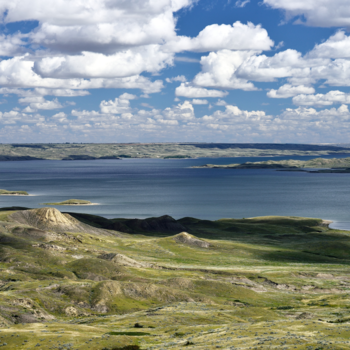 Between floods and droughts (sometimes in the same year), the compounding effects of climate change are increasingly putting stress on water resources that the environment and humans depend on.
Between floods and droughts (sometimes in the same year), the compounding effects of climate change are increasingly putting stress on water resources that the environment and humans depend on.
In July 2020, the Saskatchewan government announced a historic investment in an irrigation expansion project. With the ultimate goal to double irrigable land in Saskatchewan, the $4 billion dollars allocated over 10 years would irrigate up to 2020 square kilometers of land. This project is set to draw 1.1 million dam cube or 900 acre-feet from Lake Diefenbaker, a man-made reservoir constructed in the 60’s created for hydro-electricity, irrigation and recreation.
We are concerned that this major development is going ahead without properly consulting the impacted First Nation and métis groups (Federation of Sovereign Indigenous Nations and many others have issued letters of concern). Further, we are concerned that the project, which is sub-divided in three phases, will not undergo a single Environmental Impact Assessment. The project poses many concerns for the environment including, degrading water quality and water quantity, emitting greenhouse gases and the impact on Indigenous rights.
Important habitats for fish species like Lake Sturgeon in the South Saskatchewan River and Bigmouth Buffalo in the Qu’appelle River will also be impacted. The irrigation development area contains many Important Biodiversity and Bird Areas (IBA). This includes nesting sites for Eared Grebes and Black-crowned Night-Herons, and internationally endangered Piping Plover.
Large-scale irrigation would also increase land-use pressure to convert native prairie for agricultural purposes as well as incentivize wetland drainage to accommodate irrigation equipment.
It is clear that this project will have an environmental cost. We are advocating for this project to undergo adequate environmental assessments. We recently submitted a petition supported by numerous environmental groups in Saskatchewan for a federal Environmental Impact Assessment.
1. We ask that the project undergo federal review for an Environmental Impact Assessment to adequately assess and minimize environmental impacts.
2. We ask that governments immediately begin consultations with potentially impacted First Nations and Métis nations before further planning for this project moves forward.
Ultimately, we are advocating for true water security. We want solutions that support local economies but that do not compromise the environment and other species with whom we share the land. We need holistic and realistic approaches to address climate change and protect watersheds and wetlands.
